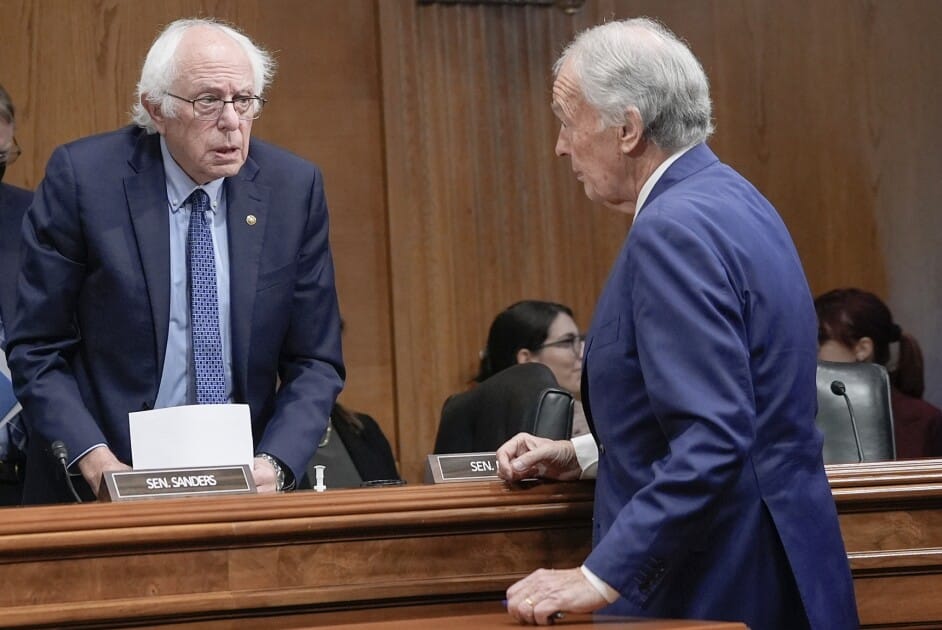Sens. Bernie Sanders, I-Vt., and Edward Markey, D-Mass., have reintroduced education bills that would increase minimum salaries for teachers to $60,000 and the minimum wage for support staff to $45,000 or $30 per hour.
“You are the champions of the students of our nation. It’s now time for us to be the champions for you,” said Markey, during a town hall held July 24.
Sanders, who chairs the Senate Health, Education, Labor, and Pensions, or HELP, committee, first introduced the Pay Teachers Act in 2023, which would outline the new minimum salaries, allocate approximately $1,000 per teacher for classroom supplies, and triple Title I-A funding. The bill never made it past the HELP committee, as GOP members opposed it.
Additionally, Markey discussed his proposed Pay Paraprofessionals and Education Support Staff Act, which would set the minimum wage for states, as well as provide health care benefits, paid leave, and professional development. This bill was also introduced in 2023 but did not make it past the HELP committee.
Like in the previous times, a divided Congress will make it difficult for either bill to pass. The reintroduction of these bills comes as the Trump administration has just abruptly reversed a $6.8 billion school funding freeze, and as the teachers’ unions continue to push on efforts to address teacher morale and workloads.
Teachers are taking home less than they did a decade ago
States and districts, not the federal government, are typically responsible for setting teacher salaries; about half of them set a statewide schedule or require districts to set a floor. Districts and teachers’ unions shape salaries through collective bargaining.
The federal proposals would require states to establish a minimum teacher salary of $60,000 and a minimum wage for paraprofessionals and education support staff of $30 an hour.
The National Education Association’s annual report on educator pay estimated that the year-over-year teacher salary would increase by 3% in the 2024-25 school year, resulting in an $74,177 average salary, compared to $72,030 in 2023-24.
However, the 2024-25 projected salary is actually a 5.1% deficit when comparing it to the 2015-16 average salary and considering inflation. “Far too many of our public-school teachers are underpaid, under-appreciated and overwhelmed,” said Sanders.
70% of school districts have starting salaries not reaching $50,000, far below the $60k minimum threshold, and in some states, not even the average salary meets that bar, as in Florida ($56,440), Louisiana ($56,779), Mississippi ($55,086), and West Virginia ($58,312).
When it comes to education support staff, the current wages are far lower than the minimum Markey’s proposing. The NEA report revealed that almost 38% of all full-time staff earned less than $25,000 annually in 2023‐24. Carole Gauronskas, vice president of the Florida Education Association, experienced the difficulty of low wages as a paraprofessional for 18 years. “My paycheck wasn’t a concern at the start, and then it became a concern,” she said. Gauronskas worked at Home Depot and as a babysitter to make ends meet before joining the state teachers’ union.
According to the PEW Research Center, 16% of full-time public elementary and secondary school teachers worked a non-school job during the summer of 2020-21. This number is the same as the pre-pandemic number during the 2017-18 academic year.
Slightly higher is the rate of full-time teachers working non-school jobs during the school year (18%) in 2020-21. And that is still much higher than the 4.6% of all U.S. workers ages 20 and older who worked multiple jobs in the same year, according to the National Center for Education Statistics and Bureau of Labor Statistics.
Advocates say educators are facing unprecedented attacks
At the town hall, educators expressed concerns about the future of teaching, gun violence, and support for low-income families because of education policy changes in 2025.
A RAND survey from June showed that even though teachers feel more burned out than other professions, the share of educators planning to leave their job dropped from 22% in 2024 to 16% in 2025.
Princess Moss, the vice president of NEA, said the Trump administration’s recent actions have made the job of an educator more difficult. In addition to fighting low wages, teachers, she said, have been faced with the administration, “trying to dictate what we can learn, two, making our immigrant children fearful of even coming to school, and three, cutting the funding and programs our students need to have a well-rounded education,” she said.
The administration didn’t comment directly on the new proposals, but reiterated that it is “committed to improving educational outcomes and prioritizing meaningful learning, not political indoctrination, in the classroom.”
“If the NEA spent as much time focused on improving literacy and math instruction for students as it does on ideological and partisan grandstanding, student achievement might not be at a historic low,” said Ellen Keast, deputy press secretary at the Department of Education.
However, student achievement is a complex subject that shouldn’t be politicized, the NEA has said in a previous statement addressing the low results for the 2022 reading and mathematics NAEP assessments for grades 4 and 8.
Randi Weingarten, the president of the AFT, emphasized the important role politics plays in education. “[Sen. Sanders and Markey] are saying we understand we have to use politics to solve problems, and these two bills are bills that are going to solve problems,” she said.
2025-07-28 17:12:34
Source link

